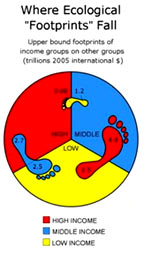
The graphic summarizes findings of a new
study on the environmental impacts of rich, middle-income and poor
nations on each other.
(Graphic courtesy Thara Srinivasan/UC Berkeley)
The first global accounting in “dollar terms” of world
nations’ toll on the environment was published in the January 2008 edition of
the research journal Proceedings of the National Academy of Sciences. The study
concludes that: “Environmental damage caused by rich and middle-income nations
disproportionately harms poor ones— and costs them more than their total foreign
debt of $1.8 trillion”
“The calculations drew on more than a decade of assessments by environmental
economists who have tried to attach monetary figures to environmental damage,
plus data from the recent U.N. Millennium Ecosystem Assessment and World Bank reports.”
A profound sense of Zen equanimity may be required to fully absorb a news of such
consequence. Let’s see how close to our hearts this dire measure of reality may
impact us.
We understand that poor nations are not the most polluting even when grouped all
together. Rich nations, leading the way for the sake of progress, are the best
at damaging the environment including the livelihood of their poor neighbours.
The damage is colossal, in many ways irreversible. 50% of ecosystems already
eradicated from the planet.
In total denial this world scale genocide is celebrated every year as the
"progress" of economic growth.
We also understand that if international justice existed, poor nations could be
absolved of all foreign debt and even be reimbursed a fair share for collateral
environmental damage from rich and middle-income nations. Yet, for poor
countries, a mouthful of dollar bills will be hard to swallow when you stand on so many lands rendered
sterile.
We then realize how futile it has become to speak of justice in terms of
financial compensation, and of progress in terms of
economic growth, a measurement that has always excluded the mother share of
environmental, cultural and human costs.
At its best the value of growth and progress on the stock markets may be likened to a measure of the transactions as rising “heat” generated by the incineration of our own global household.
In order to establish and maintain a sound direction to our individual and
collective human progress, in harmony with nature and its laws, the criteria for
measurement of progress should be those naturally rooted in the heart of every living being.
With Philosophy in the classical manner these criteria are known as: unity in
becoming an individual, union in harmonious relationships to others and nature;
wisdom in learning from our shared history. They reflect the origin and the
outcome of an ideal of progress, an elevation of consciousness.
We reap only what we sew.